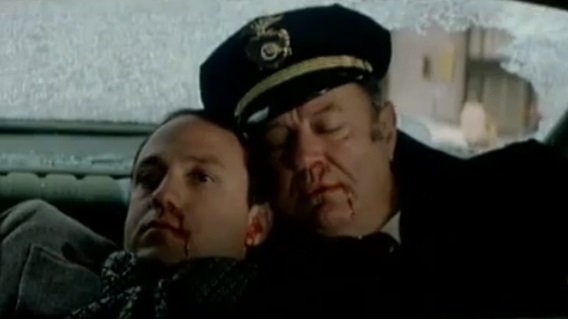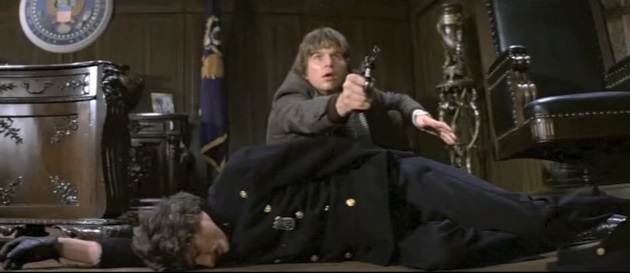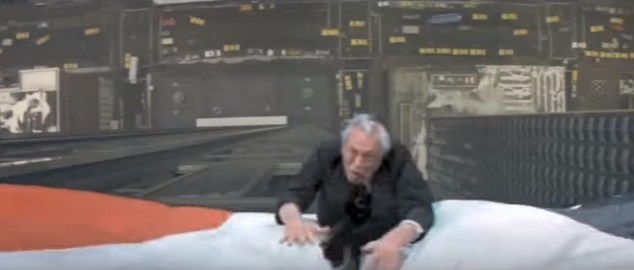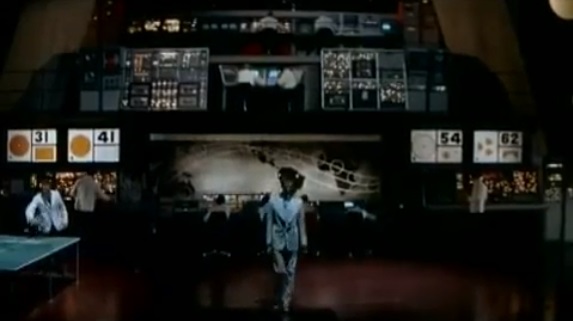“…inspired by seventies thrillers!” — ad/review copy for Captain America: The Winter Soldier
So what is a seventies thriller, anyway? Is it about corruption? Noir films are full of bribed politicians and cops on the take, full of jaded but honest men fatalistically butting heads with a crooked system. No, the “seventies thriller” is different. Bad things don’t need to happen in the shadows, for one thing — the people behind them have so much power they can operate in the daylight. And the people who have power aren’t the people in power, the ones we think we elect. They act when they please but plot their moves behind closed doors. And the worst part is, you never know who they are. They could be your friend, your family, your lover. Maybe they could be you.
But you’re not living the good life, like Nick Kegan is. He’s the son of Pa Kegan, a gajillionaire who, as he puts it, “has interests in this country” and owns stakes in everything from airlines to hospitals. Nick is introduced lounging around on his dad’s giant boat without a care in the world when an old family friend hustles aboard with the severely injured body of a man who claims to have helped assassinate Nick’s half-brother, the President of the United States, in the sixties. Any similarities to the assassination of a real president are entirely intentional.
The man says all the evidence proving he was the real killer — as opposed to a lone gunman who was killed in custody and who an official report deems as the sole assassin — is in a building in Philadelphia. Nick, having tons of money and lots of time to spend it, hustles out to the City of Brotherly Love and finds the evidence — a concealed rifle — with the help of a drunk cop and friendly assistant. This is huge! Nick is ready to blow the lid off the accepted version behind his brother’s killing, but then a woman and young child on a bicycle ride by the car his team is in and suddenly everyone but Nick is assassinated.

This sets the tone for the movie, a see-sawing series of measures undercut by countermeasures. Nick admirably weathers nearly getting killed by meeting his Pa in the enormous family compound in the Southwest. Pa enters in an enormous golf cart surrounded by beautiful women and introduces himself to the audience with the classy “What do you think these girls are doing under this blanket? Think they’re playing with my nuts?” But Pa is not all handjobs and sand wedges. He tells Nick to keep investigating without alerting any higher authorities, to find “the man behind the man.” And be careful out there — that old family friend and the assassin he found? They just turned up dead.
So Nick begins a series of missions. He has a tense discussion with one of Pa’s rivals, who is playing war games with actual tanks out in the Western wastelands. He goes to a crummy diner in Cleveland chock full of mobsters looming over every table and hovering in every cranny. And he spends time in New York City, checking in with Pa’s office at the Pan Am building, crashing in his luxury suite and trying to get with his quasi-girlfriend Yvette, whom he mainly leaves lovesick messages for on her answering machine. Everywhere he goes, people try to kill him, but while they fail in that regard, many of the people who cross his path along the way wind up dead — that cyclist woman and kid show up again at one point, tossing a dead cat and hand grenade into the mob diner. Most frustrating of all — every bit of information he does manage to glean is contradicting the other pieces of the puzzle. What’s going on here?

Winter Kills was originally a novel by Richard Condon, who made a career out of outlandish political thrillers and made his name with a story that predates the seventies thriller by a full decade: The Manchurian Candidate. That of course was made into a classic movie by John Frankenheimer, whose style owed more than a bit to noir’s shading and sweaty tension and sexual undercurrents. Winter Kills‘ writer-director William Richert is not Frankenheimer — who is? — but in the early going especially, there’s a lack of depth and snap to his scenes: sometimes it feels like a made-for-TV movie. The confrontation between Nick and a tank-driving madman — again, filmed with actual tanks — should feel crazier than it does, with far too many reaction shots of Nick downshifting that could take place anywhere. This is not an action movie, nor is it a movie that generally makes use of the actors’ placement and the camera’s motion and angle to suggest unseen watchers.
But Richert has some other cards to play (no Queen of Hearts, though). First is a bonkers cast — a bellowing Sterling Hayden as the tank-driving magnate, a menacing Ralph Meeker as mobster Gameboy (really!) Parker, Eli Wallach as the patsy who killed Kegan’s assassin, Joe Diamond (the movie is not trying to hide the connections at all here). And hey, there’s Toshiro Mifune as a butler! An unbilled Elizabeth Taylor as a madam! We know these people and seeing them all together but not even trying to cohere as a cast creates a weird unreality. So it’s all the more important to hold on to the two most consistent actors and characters — an impossibly young Jeff Bridges as Nick and John Huston as his blackly corrupt Pa.

Huston was a few years removed from playing Noah Cross, who’s on the short list of cinema’s most evil creatures, and some of the arrogant contentment of that performance is here. But he’s also amusingly lively, never really denying his rapacity even as it extends to getting regular blood transfusions from children in order to stay on the go. Bridges is more laid-back, but not as a Dude who abides. He refuses to enter politics like his dead brother did, assuming his corrupt father will get involved and snottily denying him the chance, but has no qualms about taking Pa’s money or using his name to get a good seat at a restaurant. He’s oddly childish — his bedroom contains a drum kit that he outgrew years ago, he asks his butler for Ovaltine instead of alcohol, he asks his girlfriend to marry him in a way that suggests not adult love but a young boy playing pretend. He wants to find the truth but is directed toward it instead of making his own decisions.
Bridges’ willingness to rely on others lets Richert send him all over the place to one weird setpiece after another — that tank battlefield, that diner that has more mobsters than donuts, a massive chicken coop run by a crooked cop, a secret hospital room where his father is getting that juvenile blood while relaxing in a four-poster bed and being served by sexy nurses — to say nothing of the opulent mansions and suites Pa owns that Bridges can relax in. Like the steady stream of familiar faces in clashing parts, the shifting settings leave no firm place to stand and Nick is increasingly dwarfed by his surroundings.

And the information he gets just makes things muddier. The corrupt cop tells how Joe Diamond was a low-level mobster with massive gambling debts pressured into killing off the original assassin — who the mob hired because Pa took their money but the president didn’t do their bidding. Hmm, sound familiar? Nick’s girlfriend Yvette, who works for a national newsmagazine, uses her organization’s files of dirt and contacts to get him in touch with those diner mobsters to confirm this. But they say the hit was ordered by Hollywood execs furious that they lost millions when the president stopped banging a famous actress and she killed herself in grief. And another mobster — who Pa sprung from jail — tells Nick he’s never heard of the guys he talked to, and when Nick goes to the magazine it turns out his girlfriend never worked there in the first place. What the hell is going on here?
The only way to get to the bottom of this is clearly for Nick to go see his father’s head of espionage, industrial and otherwise, who lives in a giant computer silo with endless arrays of flashing lights and monitors. There’s also a ping-pong table for fun. This man, Cerutti, is played by Tony Perkins as the tweaked-out twitching ganglia of an impossibly large neural network of bugs and taps and payoffs and buyouts, and he spills the beans — it was the madam who supplied Pa with whores who took the money from the mob, not Pa! Also, Yvette was one of Pa’s whores! Who is also a professional actress! And is now dead! And Pa ordered his own son assassinated because he wouldn’t follow his wishes! Cerutti becomes more and more unhinged, ranting about galaxies of information and a galaxy is a big, big place that you can easily get lost in. Nothing is adding up here, theories and betrayals loop over each other so that no one appears to be what they say they are. This is the movie’s great strength, creating paranoia not through unease about who is watching but through the accumulation of conflicting, rippling information, American Tabloid without even the comfort of Mr. Hoover watching over all.

“They run you ragged until you can’t tell a lie from the truth and you don’t even want to, that’s how the powerful keep their power,” that old family friend — who faked his own death, of course — tells Nick midway through the movie. And of course that old family friend shows up during the final confrontation between Nick and Pa. Pa proudly admits to his general corruption — “I’m the Jupiter of thieves!” — but denies killing his son, saying Cerutti masterminded it all. Another fake-out? The truth? It doesn’t matter, as the friend and a cop start shooting at Pa and Nick, who shoots back and kills his attackers. But not before Pa is wounded and decides to end it all by jumping off his Pan Am building balcony, shouting the valediction “Put money in South America!” and ripping a giant American flag on his way down.
Twenty years later, another wealthy American would take a nosedive off a building after a massive conspiracy unraveled, but he would land safely. In The Game, Michael Douglas is manipulated by those who love him so he can realize who he has become. Here, it’s Nick who has to recognize what he is. His father and brother are gone, but he shares their name and their power. “I’m part of the family,” he says as the movie ends.

We don’t know who killed Nick’s brother. We don’t know who killed JFK. We do know, or suspect, we don’t know the whole story, and that allows for endless conspiracy theories. But the why doesn’t matter as much as the who. Bridges finally accepts the existence of this world. It is ridiculous and insane and yet he is a part of it, one of its creators and actors.
America has always been afraid of infection: people from somewhere else coming here and bringing their ideas and agendas with them, not through anything as wholesome and straightforward as a war but through insidious infiltration. The Alien and Sedition Act, Japanese-American internments, Muslim bans — we need to keep the Them out. The lie at the heart of that Captain America movie that boasted lineage with those seventies thrillers is that ultimately its villains are external and can be expelled. Winter Kills laughs at the idea of anything so simple, that we can so clearly remove the Them from Us or even know how to make that distinction in the first place. Infection comes from elsewhere but corruption is internal and ultimately the decision of the person corrupted. It’s in us. Maybe it always was.

